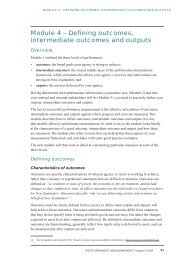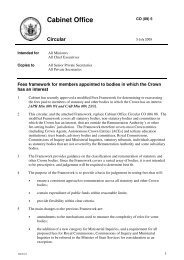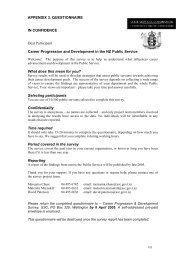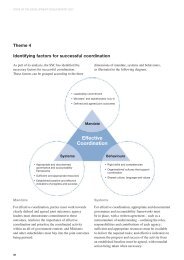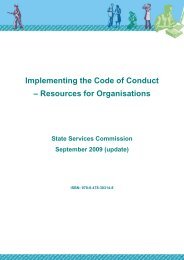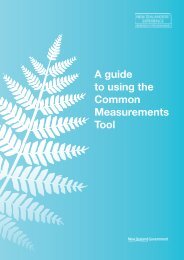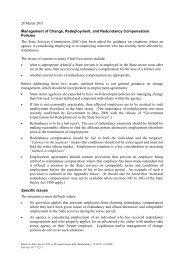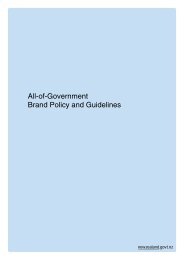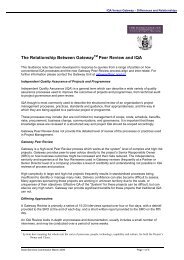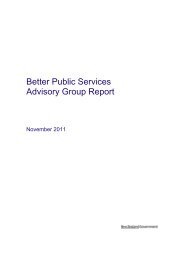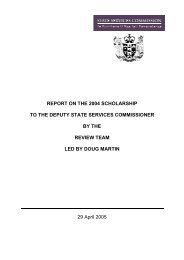PDF File - Guidance to Departments in Relation to Crown Entities
PDF File - Guidance to Departments in Relation to Crown Entities
PDF File - Guidance to Departments in Relation to Crown Entities
Create successful ePaper yourself
Turn your PDF publications into a flip-book with our unique Google optimized e-Paper software.
<strong>Crown</strong> entities are bodies corporate established by, or under, an Act. This document covers the<br />
moni<strong>to</strong>r<strong>in</strong>g of three types of <strong>Crown</strong> entity:<br />
• <strong>Crown</strong> agents must give effect <strong>to</strong> government policy when directed by the responsible M<strong>in</strong>ister<br />
• Au<strong>to</strong>nomous <strong>Crown</strong> entities (ACEs) must have regard <strong>to</strong> government policy when directed by the<br />
responsible M<strong>in</strong>ister, and<br />
• Independent <strong>Crown</strong> entities (ICEs) cannot be directed on government policy (s105), or regard<strong>in</strong>g<br />
statu<strong>to</strong>rily <strong>in</strong>dependent functions, or <strong>to</strong> br<strong>in</strong>g about specific results (s113) unless allowed under<br />
an Act other than the <strong>Crown</strong> <strong>Entities</strong> Act.<br />
M<strong>in</strong>isters have a range of specific powers (see Appendix 1) with respect <strong>to</strong> <strong>Crown</strong> entities, but no<br />
<strong>Crown</strong> entity can be directed regard<strong>in</strong>g statu<strong>to</strong>rily <strong>in</strong>dependent functions or <strong>to</strong> br<strong>in</strong>g about specific<br />
results for a particular person (s113).<br />
ICEs typically operate at arm’s length from M<strong>in</strong>isters – either because they are quasi judicial or<br />
because they must operate, and must be seen <strong>to</strong> operate, <strong>in</strong>dependently from M<strong>in</strong>isters.<br />
M<strong>in</strong>isters have powers with all entities on matters of strategic direction, targets, fund<strong>in</strong>g,<br />
performance, report<strong>in</strong>g and reviews (s27). Powers should be exercised so as not <strong>to</strong> unduly <strong>in</strong>hibit the<br />
functions of ICEs.<br />
Boards govern their<br />
entity, and are<br />
responsible <strong>to</strong> the<br />
M<strong>in</strong>ister for<br />
performance<br />
Boards govern their entity, and are responsible <strong>to</strong> the M<strong>in</strong>ister for<br />
performance. <strong>Departments</strong> advise M<strong>in</strong>isters on <strong>in</strong>dividual <strong>Crown</strong><br />
entities’ direction, plans and performance. When appropriate,<br />
departments should also advise M<strong>in</strong>isters on how entities can<br />
contribute more widely by work<strong>in</strong>g with other entities and<br />
departments <strong>in</strong> a sec<strong>to</strong>r, or across sec<strong>to</strong>rs. In some recent cases<br />
M<strong>in</strong>isters have expected departments <strong>to</strong> play a leadership role <strong>in</strong> a<br />
multi-entity sec<strong>to</strong>r.<br />
A. <strong>Relation</strong>ships<br />
Good relationships<br />
between M<strong>in</strong>isters,<br />
<strong>Crown</strong> entity boards<br />
and senior managers,<br />
and departments are<br />
essential for a<br />
department <strong>to</strong> perform<br />
its role <strong>in</strong> relation <strong>to</strong><br />
<strong>Crown</strong> entities<br />
Good relationships between M<strong>in</strong>isters, <strong>Crown</strong> entity boards and<br />
their senior managers, and departments are essential for a<br />
department <strong>to</strong> perform its role <strong>in</strong> relation <strong>to</strong> <strong>Crown</strong> entities. The<br />
parties must share a common understand<strong>in</strong>g of their roles,<br />
responsibilities and <strong>in</strong>teractions. The legal separation of <strong>Crown</strong><br />
entities from the <strong>Crown</strong>, coupled with M<strong>in</strong>isters’ expectations for<br />
professional relationships between departments and entities, can<br />
make this a complex relationship <strong>to</strong> manage.<br />
M<strong>in</strong>isters want <strong>to</strong> build and ma<strong>in</strong>ta<strong>in</strong> constructive and professional<br />
relationships with each of their entities that recognise the statu<strong>to</strong>ry role<br />
and the responsibilities of each party. In general this will be aided by:<br />
• the M<strong>in</strong>ister, department and board hav<strong>in</strong>g a clear and agreed<br />
understand<strong>in</strong>g of their respective roles and that of any agent<br />
support<strong>in</strong>g the M<strong>in</strong>ister 4<br />
4<br />
This requires clear communication of, and agreement on, roles.<br />
<strong>Guidance</strong> <strong>to</strong> <strong>Departments</strong> <strong>in</strong> <strong>Relation</strong> <strong>to</strong> <strong>Crown</strong> <strong>Entities</strong> | 5




